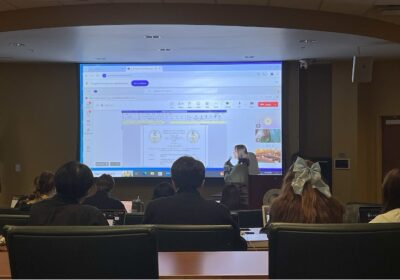USF aims to make students ‘global citizens’
USF World increased undergraduate student participation in study abroad programs by 29 percent in 2012, but many students still can’t afford the cost of international travel.
In June, the Global Citizens Project, a steering committee of faculty, staff, students and alumni, was set up to find a way for students to gain the benefits of an expensive travel abroad experience without leaving Tampa.
The committee is tasked with providing a Quality Enhancement Plan (QEP), addressing the goal of making every graduate of USF a global citizen. Every five years, the university must submit a new QEP of its choice to the Southern Association of Colleges and Schools to reaffirm its accreditation.
Karla Davis-Salazar, associate dean of undergraduate studies and the chair of the steering committee, said the QEP is essentially like a research project.
“We want to take a look at, ‘What do we want our students to know and be able to do? How well are they performing in those areas right now? What can we do to improve their learning in those areas?’” Davis-Salazar said. “And then we have to implement those new ideas and assess them to see if there is improvement.”
The Global Citizens Project committee formed to look at what the school valued and what it could improve on.
The committee drew its theme from the university’s first goal of its five-year strategic plan, which is “to produce well-educated and highly-skilled global citizens through our continuing commitment to student success.”
One area the committee is looking at is the general education curriculum. The last time the university submitted a QEP, it resulted in a total overhaul of the general education program.
“General education is a place where we can have a broad impact on students,” Davis-Salazar said. “It may be that we enhance some area of general education to enhance student learning with regards to global citizenship.”
The committee will look to implement globally oriented material into general education classes, teaching students that what they learn in classrooms, can transfer over into the global workplace.
“There’s a bunch of literature which talks about how employers are now looking for people who understand global markets and culture,” Davis-Salazar said. “Students who are more globally aware of different social issues and cultures will be more appealing to employers.”
The committee will also look at ways to expand study abroad opportunities in order for more students to have access to international travel. This could be anything from more advertising of travel abroad opportunities, to increased funding for travel abroad scholarship programs, Davis-Salazar said.
Roger Brindley, vice provost and USF System associate vice president for USF World, said part of preparing students to be successful is getting them to be globally engaged.
“Part of the strategic plan puts pressure on people like me to make sure that we continue to increase the number of students at USF that have an education experience overseas,” he said. “We have to keep sending more students abroad each year.”
Brindley said that traveling abroad not only makes students more competitive in their career field, but it also makes them more well-rounded individuals.
“Students that travel abroad will tell you that traveling abroad is a transformative experience,” Brindley said. “Not only do you get to understand another culture, you get to experience first hand different perspectives and values. When you return home to your own culture, you see things in a new way.”
The committee is in the process of creating a website and a marketing campaign that they hope to unveil towards the end of the month.
SACS requires the committee to receive broad-based input for the QEP, including student input. Davis-Salazar said the committee has already asked faculty to poll their classes about what they think a global citizen is. She said the consensus so far seems to match what the faculty has said.
“So far, students have said they think a global citizen is someone with an open mind, someone who is tolerant and adaptable, well-traveled and volunteers in community service,” Davis-Salazar said.
The committee hopes within the next year and a half they can reach out to students and faculty to find ways to expand existing programs and activities on campus that will be more globally oriented.
For Brindley, the best informal way for students to become more globally aware is already available to them: simple conversation.
“All our international freshmen live in dorms just like our domestic freshmen,” he said. “When you live in a dorm and a student two doors down from your room comes from Saudi Arabia or comes from Turkey, go knock on the door and introduce yourself. Say hello. You’ll learn about them and they’ll also learn more about you.”







